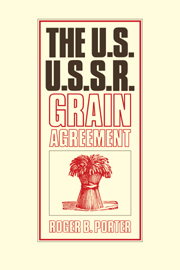Book contents
- Frontmatter
- Contents
- Foreword
- Preface
- List of acronyms used in the text
- 1 Introduction
- 2 U.S.–Soviet grain trade before 1974
- 3 The 1974 experience
- 4 The Russians return
- 5 First steps
- 6 A strategy emerges
- 7 Agreement to seek a long-term arrangement
- 8 Refining the details
- 9 Ebbing leverage: the waiting game
- 10 Evaluations
- 11 Reflections
- Epilogue
- Appendices
- Bibliography
- Index
6 - A strategy emerges
Published online by Cambridge University Press: 05 November 2011
- Frontmatter
- Contents
- Foreword
- Preface
- List of acronyms used in the text
- 1 Introduction
- 2 U.S.–Soviet grain trade before 1974
- 3 The 1974 experience
- 4 The Russians return
- 5 First steps
- 6 A strategy emerges
- 7 Agreement to seek a long-term arrangement
- 8 Refining the details
- 9 Ebbing leverage: the waiting game
- 10 Evaluations
- 11 Reflections
- Epilogue
- Appendices
- Bibliography
- Index
Summary
DEALING WITH THE SOVIETS
The USDA's hold on additional sales to the Soviet Union, at least until after the August II crop report, temporarily placed the issue on the back burner. Meanwhile, a staff-level interagency group with representatives from the Departments of State and Agriculture and the Council of Economic Advisers was considering ways to capitalize on the leverage that the Soviet predicament apparently gave the United States.
On Monday, August 4, Seidman received a draft of the Department of Agriculture's suggested remarks for the president's speech on August 18 at the Iowa State Fair; a day later he received a draft memorandum on the U.S. and Soviet crop situations that he had requested Paul MacAvoy to prepare. Seidman and Porter met with MacAvoy and later with Under Secretary of State Robinson to discuss the grain situation and the August 18 speech. On Tuesday afternoon, Seidman sent the MacAvoy memorandum to Secretaries Butz and Dunlop, Alan Greenspan, and Under Secretary Robinson, indicating that he wanted to discuss it at a meeting at 11:30 A.M. the following morning.
The memorandum noted a slowdown in Russian demands for U.S. grain, recent dry weather in the western corn belt that had probably reduced the U.S. corn crop by as much as 5 million tons, and Soviet purchases of approximately 14 million tons of grain in international markets, including the 9.8 million tons from the United States.
- Type
- Chapter
- Information
- The U.S.-U.S.S.R. Grain Agreement , pp. 49 - 58Publisher: Cambridge University PressPrint publication year: 1984



